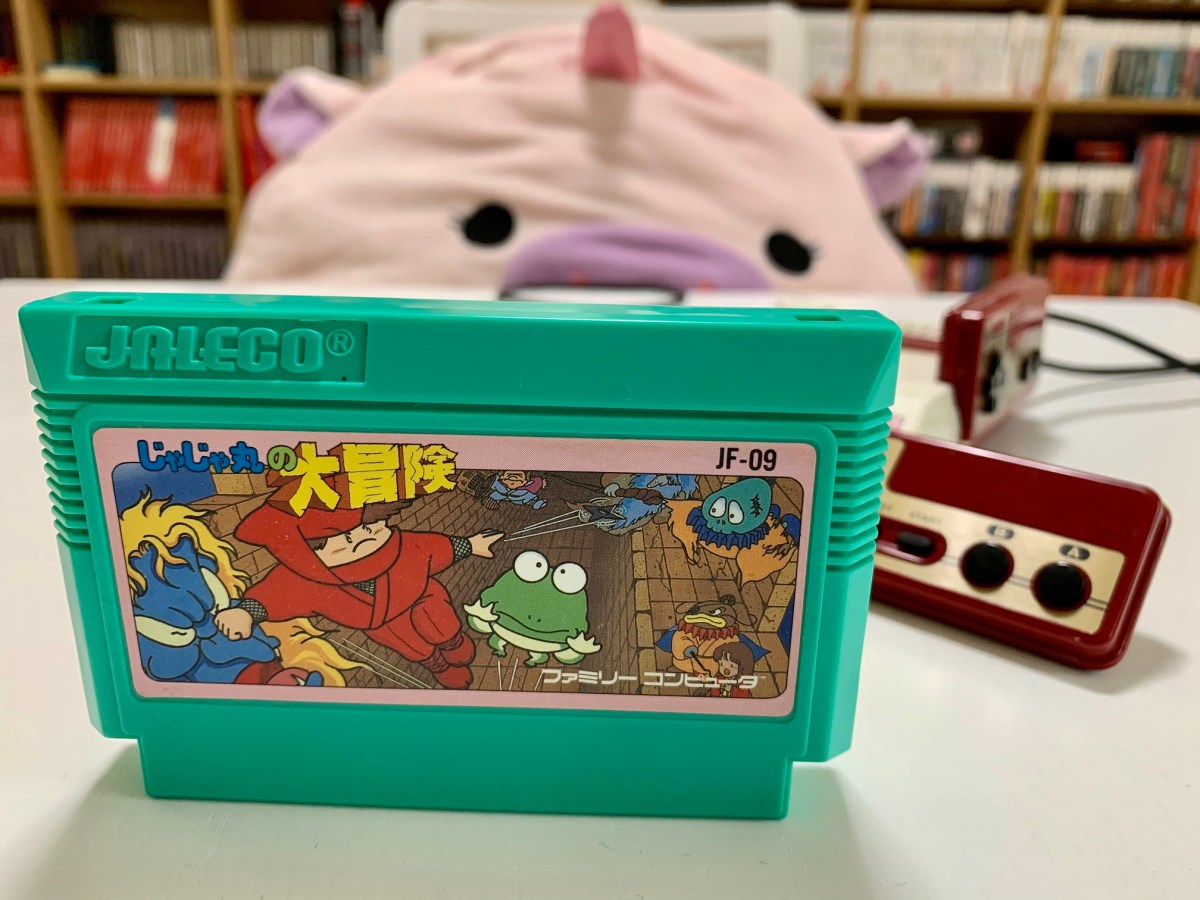Daibouken means “big adventure”
I have a serious soft-spot for Jajamaru-Kun. It was Jaleco’s almost-classic series of games. None were all that great, but they tried their little hearts out. 1986’s Jajamaru no Daibouken was the second game in the series (third if you count Ninja-Kun). Super Mario Bros. dominated the previous year, so for the sequel, Jaleco decided to change the formula to be more of a side-scrolling platformer.
1986 was the year that Metroid and Castlevania hit the scene. Next to them, Jajamaru no Daibouken is pretty embarrassing. It’s an obvious attempt to keep up with the pack but makes so many mistakes that it’s not batting in the same league. Despite that, it’s everything I love about plumbing the Famicom library. It’s unique, it’s blatantly Japanese, and it seems to exist in a moment that we never saw in the West.

Jajamaru no Daibouken has the same story as Ninja Jajamaru-kun. The princess has been taken prisoner by the Catfish pirate. Go save her. The big difference here is that instead of clearing out a bunch of short levels, you alternate between reaching the right side of the level and fighting a boss.
The levels are completely horizontal and typically consist of a bunch of floating platforms. Some of the blocks are destructible and contain either money, power-ups, or a bomb so you can die in a fire. There’s a wide variety of enemies standing in your way, and you throw shurikens to make them die. Pretty standard stuff.
The controls in Jajamaru no Daibouken are extraordinarily floaty. You’re also allowed only two projectiles on screen at a time, so if you miss, you’re waiting until those babies fall off the edge of the screen before you throw another. It’s not that difficult in concept, but there are 20 levels (before it just loops back to the beginning) and no continues. Minute-by-minute, it’s easy-peasy, but actually climbing to the top is monumental.

Seizure warning
The bosses are fun, but not in the sense that they’re enjoyable to fight. They’re very basic and rather easy to defeat, but they’re things like warrior monks and Raijin (who appears to be peeing at the ground at high velocity). The monsters themselves are unique. I was delighted when I hit the game’s depiction of rokurokubi, the long-necked woman yokai. In general, I enjoy the game’s sprite-work. Its squat critters are quite charming.
The power-ups are where things get weird. The contents of blocks are randomized, so you could get one at any time, and four of the five of them cause invincibility. There’s a cart that lets you run over enemies, a potion that turns you intangible, and if you collect those and the shuriken upgrade, the screen just goes ballistic, and everything that appears on screen instantly dies. Seizure warning. If you’re really lucky, you’ll find Jajamaru-kun’s frog, Gamapakkun. Also seizure warning. He too makes you invulnerable and can eat enemies. Each one of these overpowered pick-ups lasts a long time, so you can scoot through huge portions of a level on a single power-up.
The fact that finding these are based entirely on luck is hilarious to me. You can find a cart in the first block you break, then the level is just cake. It’s the equivalent of being born rich. Struggling is for poor people. Just tell the game that your dad plays golf with the chief of police and that DUI never happened. See you at the finish line.

As sloppy as Jajamaru no Daibouken is, I found it to be a lot of fun. As I said, it’s not in the same league as Castlevania, but it has an infectious charm to it. If you’re privileged enough to find all the good power-ups, you can have the whole game finished rather quickly, but luck has a habit of not arriving on time. It had the mindset of arcade-to-console ports at the time in the fact that you were supposed to play them for the high score.
To my knowledge, Jajamaru no Daibouken was never ported from the Famicom. That is until the Famicom games were gathered up into the Ninja Jajamaru Collection on Switch and PS4. Of course, that was only released in Japan, but we’re living in a (mostly) region-free world. It’s just too bad we didn’t get a localized version here in the west, since some of the games are more text-heavy.
You don’t really need to know Japanese to play Jajamaru no Daibouken, though. There isn’t much text at all, and the hardest to discern part of it is the score that each enemy gives, as it’s written in the classic Japanese style. If that still throws you off, I was able to find a fan translation of it.
Check out previous Famicom Fridays right here.






Published: May 27, 2022 04:00 pm